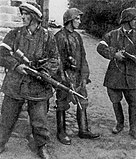
Vilnius University is a public research university, which is the first and largest university in Lithuania, as well as one of the oldest and most prominent higher education institutions in Central and Eastern Europe. Today, it is Lithuania's leading research institution, ranked among the Top 29% Higher Education Institutions in the world.

The Silent Unseen were elite special-operations paratroopers of the Polish Army in exile, created in Great Britain during World War II to operate in occupied Poland.
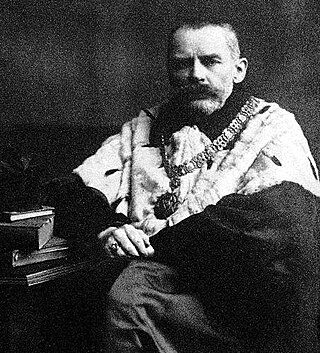
Paulin Kazimierz Stefan Żorawski was a Polish mathematician. Żorawski's main interests were invariants of differential forms, integral invariants of Lie groups, differential geometry and fluid mechanics. His work in these disciplines was to prove important in other fields of mathematics and science, such as differential equations, geometry and physics.

Sonderaktion Krakau was a German operation against professors and academics of the Jagiellonian University and other universities in German-occupied Kraków, Poland, at the beginning of World War II. It was carried out as part of the much broader action plan, the Intelligenzaktion, to eradicate the Polish intellectual elite, especially in those centers that were intended by the Germans to become culturally German.

The Ivan Franko National University of Lviv is a public university in Lviv, Ukraine.
The Flying University was an underground educational enterprise that operated from 1885 to 1905 in Warsaw, the historic Polish capital, then under the control of the Russian Empire, and that was revived between 1977 and 1981 in the communist People's Republic of Poland.
The history of philosophy in Poland parallels the evolution of philosophy in Europe in general.
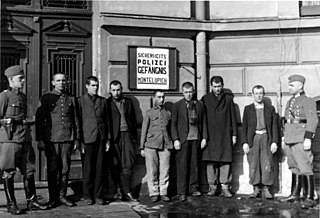
The Montelupich Prison, so called from the street in which it is located, the ulica Montelupich, is a historic prison in Kraków from early 20th century, which was used by the Gestapo in World War II. It is universally recognized as "one of the most terrible Nazi prisons in [occupied] Poland". The Gestapo took over the facility from the German Sicherheitspolizei at the end of March 1941. One of the Nazi officials responsible for overseeing the Montelupich Prison was Ludwig Hahn.

Władysław Konopczyński was a leading Polish historian and publisher of primary-source materials.

Tadeusz Walenty Pełczyński was a Polish Army major general, intelligence officer and chief of the General Staff's Section II.
Polish culture during World War II was suppressed by the occupying powers of Nazi Germany and the Soviet Union, both of whom were hostile to Poland's people and cultural heritage. Policies aimed at cultural genocide resulted in the deaths of thousands of scholars and artists, and the theft and destruction of innumerable cultural artifacts. ''The maltreatment of the Poles was one of many ways in which the Nazi and Soviet regimes had grown to resemble one another", wrote British historian Niall Ferguson.

The University of Warsaw is a public research university in Warsaw, Poland. Established in 1816, it is the largest institution of higher learning in the country, offering 37 different fields of study as well as 100 specializations in humanities, technical, and the natural sciences.

Tadeusz Stefan Gajcy alias Karol Topornicki”, „Roman Oścień”, „Topór”, „Orczyk“ , was a Polish poet, playwright, editor-in-chief of the Sztuka i Naród periodical, member of the Confederation of the Nation, soldier of the Home Army.
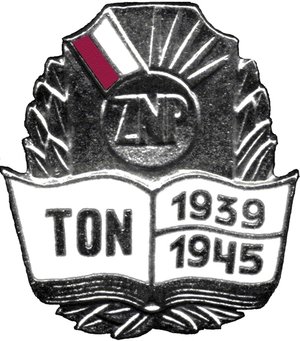
Secret Teaching Organization was an underground Polish educational organization created in 1939 after the German invasion of Poland to provide underground education in occupied Poland during World War II.
Institute of Philosophy of the University of Warsaw is a research institution located in Warsaw, part of the Faculty of Philosophy and Sociology of the University of Warsaw. It is renowned mainly for its contribution to the development of modern logic and analytic philosophy and to history of ideas. Provides master's degree studies, doctor's degree studies and postgraduate studies in philosophy both in Polish and in English.
On September 1, 1939, the armed forces of Nazi Germany invaded Poland from the west initiating World War II. Two weeks later, on September 17, Soviet Union joined Germany in their attack on the Second Polish Republic. By early October, Poland was defeated. The occupied Poland was the only country in Europe where the Nazis had introduced a total ban on regional sports clubs. Football was allowed to be practised only by the Germans in the annexed areas of Upper Silesia. Polish activists and players risked their lives by organizing clandestine football competitions in Kraków, Warsaw and Poznań.
The Polish School of Medicine at the University of Edinburgh was established in March 1941. Initially, the idea was to meet the needs of the Polish Armed Forces for doctors but from the outstart, civilian students were admitted. Founded on the basis of an agreement between the Polish Government in Exile and the Senate of The University of Edinburgh this unique wartime initiative enabled students to complete their medical degrees.
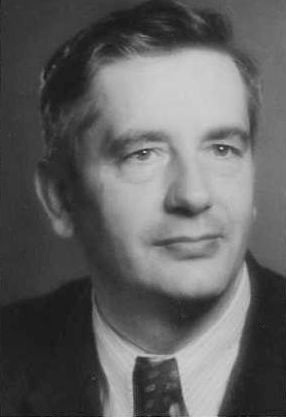
Czesław Ścisłowski was a Polish physicist, educator, university professor, author of school books and science articles, the initiator and organizer of International Physics Olympiad for high school students. Before World War II he was the principal teacher of the science class at the Stefan Batory High School in Warsaw, many of whose students became wartime resistance heroes.
